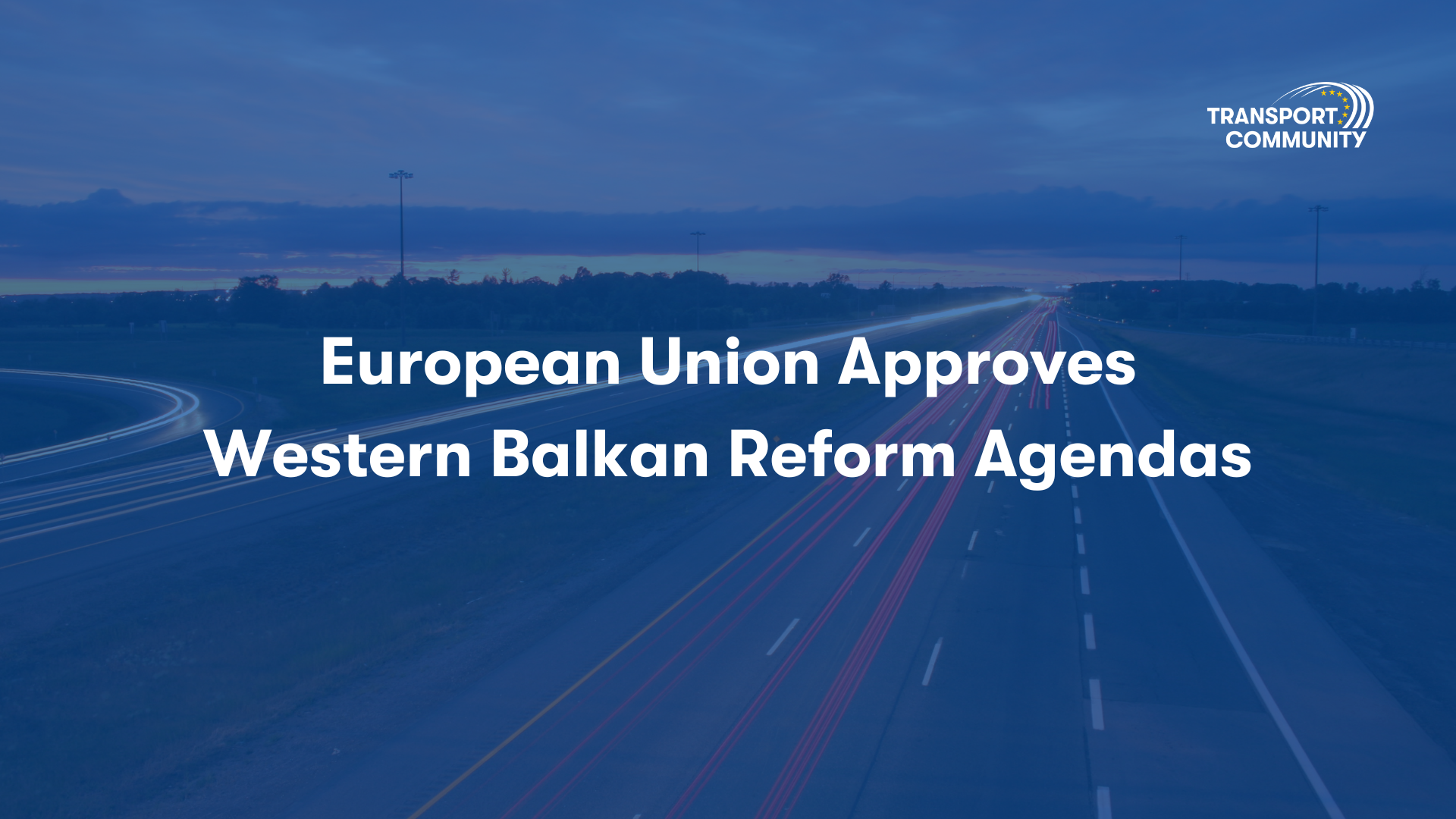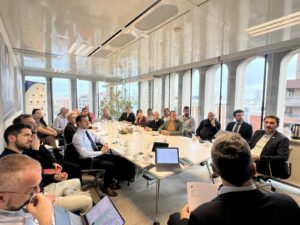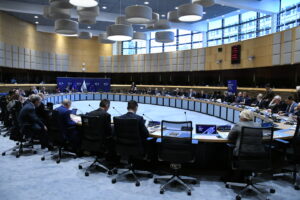WESTERN BALKANS / BRUSSELS – The Permanent Secretariat of the Transport Community welcomes the European Commission’s approval of the Reform Agendas of Albania, Kosovo*, Montenegro, North Macedonia, and Serbia following the EU Member States’ positive opinion. To enhance growth and convergence with the EU under the Growth Plan during the period of 2024 – 2027, the five Western Balkan regional partners have committed to socio-economic and fundamental reforms as outlined in their Reform Agendas. The Permanent Secretariat of the Transport Community remains committed to assisting the regional partners in the implementation of transport policy reforms and projects.
As outlined in the European Commission’s communication, the Reform Agendas focus on the reforms in the priority areas of rule of law and other fundamentals, governance, the digital and green transition, human capital development and the business environment. In addition, each beneficiary has proposed a list of indicative investments to be funded under the Facility, critical to unlocking socio-economic growth, to be approved in the context of the Western Balkan Investment Framework.
The European Commission has also stated that it is looking forward to Bosnia and Herzegovina formally submitting their Reform Agenda to proceed with its assessment and continuing the support to the authorities to finalise it, for the benefit of all citizens.
For each of the regional partners, the following have been outlined as the key objectives in the field of transport:
ALBANIA
Measures include improving of cross-border trade by the deploying e-freight and Intelligent Transport Systems and critical infrastructure investments, notably in sustainable transport (Corridor VIII Railway; Blue Corridor Highway).
Reforms foreseen in Albania’s Reform Agenda on transport are appropriate and ambitious and will improve the deployment of e-freight and Intelligent Transport Systems, with outputs that will lead to alignment with EU rules regarding electronic freight information, UN rules of the carriage of goods, and steps towards implementing EU-compliant traffic information services. They aim to improve trade flows within the region and with the EU. By implementing e-customs, a reduction of time in transit as well as improved export and import control procedures (time reduction, increase in declarations for digitalised procedures) can be expected. Deployment of Intelligent Transport System for road, rail and maritime sector and deployment of e-freight will lead to reduced travel time and accidents, enhancing safety.
KOSOVO
In the transport sector, the reforms focus on deploying Intelligent Transport Systems and e-freight, and lowering emissions and fuel consumption which will have a positive environmental impact and reduce greenhouse gas emissions linked to transportation.
Kosovo aims at continuing the rehabilitation of core TEN-T railway network with investments along the Rail route 10, including the railway connection to Pristina Airport. Road infrastructure aims at Pristina by-pass as well as other core TEN-T network sections. Kosovo also wants to explore financing opportunities for the construction of multimodal dry port in Pristina.
MONTENEGRO
The Reform Agenda of Montenegro will ensure alignment with the EU acquis and relevant standards in a range of policy areas including transport. Measures focus on the improvement of cross-border trade by the deployment of e-freight and Intelligent Transport Systems, while Montenegro is expected to develop its approach on Intelligent Transport System, including the European Rail Traffic Management System (ERTMS), when further operationalising the related reform step.
Montenegro aims at continuing the construction of core TEN-T road and railways network with investments along the Road/Rail Route 4, the Bar – Boljare Highway and Bar – Vrbnica Railway, being the long-term priorities of Montenegro.
NORTH MACEDONIA
The Reform Agenda is complementary with the flagships of the European Investment Programme in particular concerning transport, such as works on Corridor X and Corridor VIII. It will also help North Macedonia align with the EU acquis on Intelligent Transport Systems for rail and road.
Reforms on transport will be improved by the deployment of e-freight and Intelligent Transport Systems, with outputs that will lead to alignment with EU rules electronic freight information and steps towards implementing EU-compliant traffic information services, which will improve trade flows within the region and with the EU. By implementing e-customs, a reduction of time in transit as well as improved export and import control procedures (time reduction, increase in declarations for digitalised procedures) can occur. Deployment of Intelligent Transport System for road and rail and deployment of e-freight will lead to reduced travel time and accidents, enhancing passenger safety.
The investments tend to follow closely the foreseen reforms in the given sectors, where plans to improve the transport network of Corridors X and VIII, both rail and road, are visible, ensuring efficient connectivity on the ground, while implementing the necessary Intelligent Transport System soft measures.
SERBIA
Serbia has committed to reforms concerning the Intelligent Transport System and e-freight. The implementation of the ITS frameworks and standards for road and rail, the legislative alignment with and implementation of the electronic freight transport information (eFTI), and the deployment of traffic data collection and road user information systems will lead to more efficient, transparent and safe transport services, both for users and operators, while it is expected to result in significantly lower costs, reduced administrative burden, faster processing times and potentially better management of traffic flows.
In the area of transport, the indicative list of projects covers all priority investments in the railway sector, including the Rail route 4 between Serbia and Montenegro, the Vrbnica railway line which benefits from substantial WBIF support since the 2015 Connectivity Agenda, the Rail route 10 connecting Serbia with Kosovo, and finally the fully mature proposal for the rehabilitation of the Corridor X section Stara Pazova – Šid, currently submitted under the WBIF.
Next Steps
The European Commission shall now proceed to signing loan and facility agreements with the beneficiaries, which will include obligations for beneficiaries to undertake appropriate measures to prevent, detect and correct fraud, corruption, conflicts of interests and irregularities affecting the financial interests of the European Union, to avoid double funding and to take legal action to recover funds that have been misappropriated, the collection of adequate data on the recipients of funds under the Facility and the rights to be granted to the Commission, the European Anti-Fraud Office (OLAF), and the European Public Prosecutor’s Office (EPPO) where applicable.
In parallel, beneficiaries can request the release of a pre-financing of up to 7% of their total indicative allocation foreseen under the Facility.
The disbursement of pre-financing will be subject to the entry into force of the facility and loan agreements, and subject to the respect of the preconditions, which the Commission will monitor ahead of each payment.
Background
On 8 November 2023, the European Commission adopted the Growth Plan for the Western Balkans. This ambitious Plan aims to accelerate the socio-economic convergence of the region with the EU and pave the way to EU membership. The Plan is supported by an increase of financial assistance through the new Reform and Growth Facility which entered into force on 25 May 2024. The Facility will complement the current financial assistance under the Instrument for Pre-accession Assistance (IPA III).
The Facility has a financial envelope of €6 billion, including €2 billion in grants and €4 billion in highly concessional loans. At least half of the total amount (grants and loans) will go to investments through the Western Balkans Investment Framework (WBIF).
The remaining amount of loans will be provided to the treasuries of the Western Balkan governments to accelerate growth based on socio-economic reforms.
______________
* This designation is without prejudice to positions on status, and is in line with UNSCR 1244/1999 and the ICJ Opinion on the Kosovo declaration of independence.

